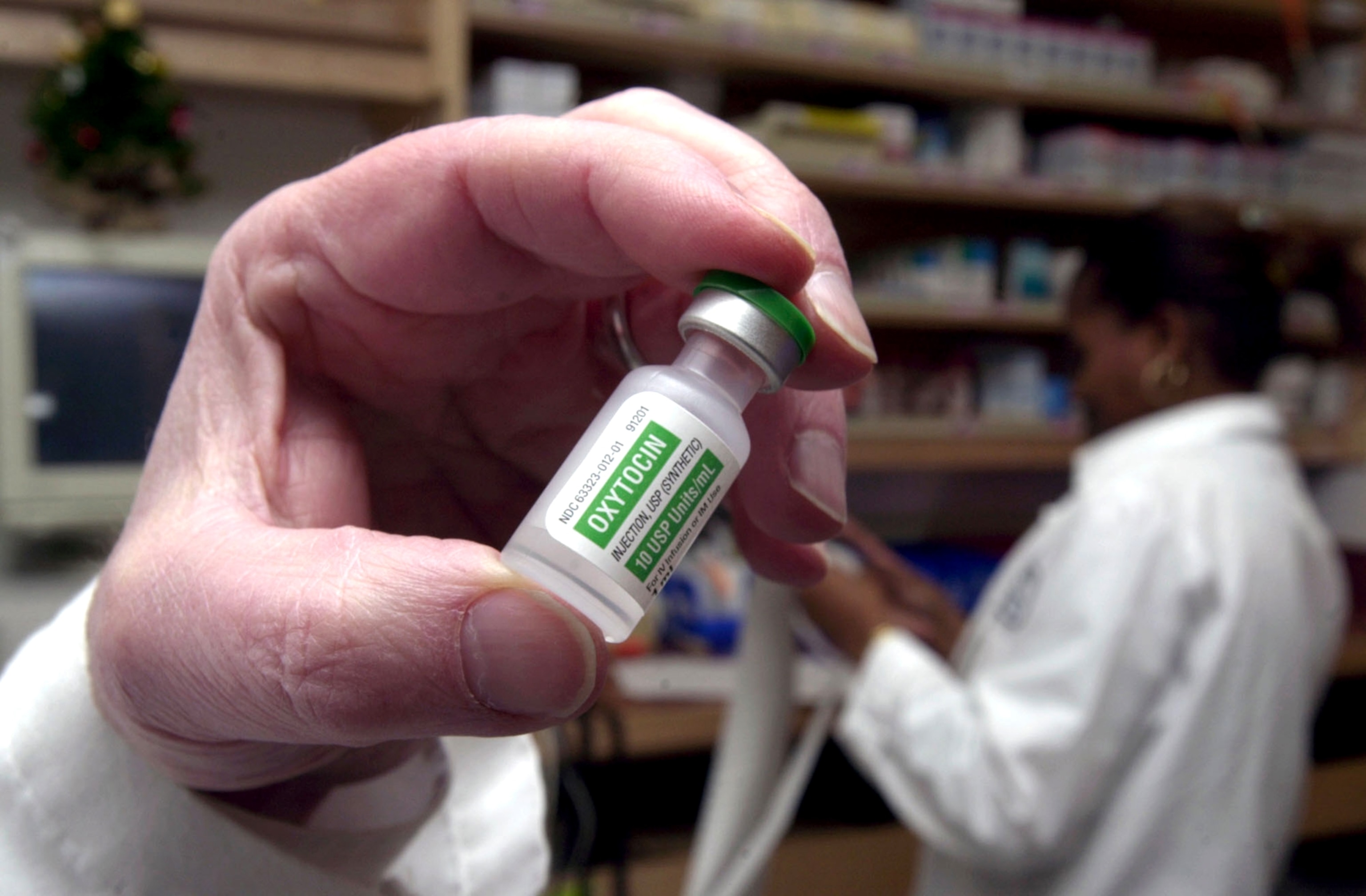
Oxytocin: The "Love Hormone" Might Also Help in Autism
A new study suggests oxytocin could benefit autistic kids. But is it ready for prime time?
Part of our weekly "In Focus" series—stepping back, looking closer.
Anything nicknamed the "love hormone" probably needs a closer look and a dash of skepticism. After all, nothing in biology is simple.
But lately, oxytocin has been making headlines that seem too good to be true—most recently because of a paper published in the Proceedings of the National Academy of Sciences showing that a single spray from a nasal inhaler enhanced areas of the brain involved in processing social information in 17 children with autism.
First studied for its role in childbirth and breastfeeding, oxytocin is at its core a reproductive hormone. Produced in the brain's hypothalamus, and secreted into the bloodstream by the pituitary gland, it triggers muscle contractions during labor. When mothers breastfeed, the hormone works to contract muscle cells around the nipple, causing the muscles to squeeze milk out of the glands and into the milk ducts, a process known as the milk ejection reflex or, as many nursing mothers know it, the let-down reflex.
That's not all. The pleasure that many women feel during breastfeeding is more sensual than sexual, but that good feeling might come as no surprise considering that oxytocin is also released during orgasm in both men and women. The hormone enhances the bond between a man and a woman, and between mother and baby.
But Wait, There's More
Its potential benefits have excited scientists and sparked media interest. Intranasal sprays of oxytocin have been shown to make investors trust strangers in an economic trust game. When men inhale a whiff of the hormone, then look at photographs of their wives and of other women they know, they report—and brain-imaging technology confirms—greater attraction to their wives, making it something of a monogamy hormone.
In other studies, it has been shown to increase trust, empathy, and generosity. A hug, eye contact—even petting a beloved dog—have been shown to release oxytocin and have a positive effect on the pleasure centers of the brain.
It's little wonder that oxytocin is sometimes oversimplified as the love hormone and as the hug and cuddle chemical.
Oxytocin's Effect on People With Autism
But it's a complicated chemical, produced in the brain and traveling through the blood to receptors throughout the body. The PNAS study marks the first time that the brains of autistic children, between the ages of 8 and 16, were studied using fMRI technology following nasal inhaler doses of oxytocin.
"The best metaphor is that it opens up social pores in the brain so the brain is better able to process social things," says the study's first author Ilanit Gordon, of the Yale Child Study Center. "And at the same time it helps tune out objects, stuff that can inhibit you from learning."
People with autism are commonly intrigued by, say, a car parked in the driveway or a stash of pencils on a table and less interested in looking at people or reading their faces. "We're thinking that we're onto a potential substance that can help in tuning in better to social things," says Gordon.
While this is the first study to show that a spray of oxytocin affects brain function in children with autism, small studies on the hormone and behavior in those with autism have been encouraging. One study of 15 adults with autism found that after a dose of oxytocin, the research subjects were better able to understand if a speaker was happy, sad, or angry. Another study of 16 boys , ages 12 to 19, found that they were better able to read emotion in the eyes and faces of others after a nasal dose of oxytocin.
Oxytocin nasal spray is not approved for treatment of autism, but some parents are using it (often obtained from compounding pharmacies) despite a lack of definitive scientific proof. That's one reason for some urgency in testing it on a large, diverse group of children with autism, according to Linmarie Sikich, director of the Adolescent and School-age Psychiatric Intervention Research (ASPIRE) Program at the University of North Carolina.
"We know people out in the community are giving kids oxytocin in various formulations. It's around. Nobody knows if it works, and nobody knows how safe it is or what its benefits are," she says. "We want first and foremost to look at its safety."
She hopes to begin a study in the spring of 300 children with autism, ages 3 to 17. Half of them will receive oxytocin nasal spray twice a day for six months, while the other half will get a placebo spray.
More Studies Needed
Some in the research community, like Karen Bales, vice chair of psychology at the University of California, Davis, have concerns. She has studied oxytocin in monogamous prairie voles and cites some results from her own work as worrisome. When adolescent voles were given oxytocin until adulthood, they first showed the expected increase in bonding behaviors, like spending more time with cage mates.
But when researchers followed up, they found that the adult males preferred strangers to their mates. Brain studies showed they were producing less natural oxytocin than normal. "We had induced changes in their brains," she says.
No one knows what the long-term effects of inhaled nasal oxytocin will be on the developing brains of children. Bales and Gordon, of the PNAS study, both said they'd like to see a human trial in which infrequent doses of oxytocin are paired with techniques known to help autistic children, like intense behavioral therapy, to see if the hormone would boost the benefits of other therapies.
"I do think oxytocin holds some promise," says Bales, who would like to see more work with animals before human experiments begin. "I just think we're going too fast."